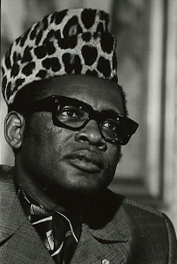Top Qs
Timeline
Chat
Perspective
Manifesto of N'sele
1967 Congolese political manifesto From Wikipedia, the free encyclopedia
Remove ads
The Manifesto of N'sele (French: Manifeste de la N'sele) was a political document issued in the Democratic Republic of the Congo (later renamed Zaire) on 19[1] or 20[2] May 1967 which set out the official political stance of the Popular Movement of the Revolution (Mouvement Populaire de la Révolution, MPR), a political party which had been founded by Joseph-Désiré Mobutu in 1966. The manifesto was created at an MPR meeting in N'sele, Kinshasa where it was based.[2]

The Manifesto of N'sele defined the ideological position of the MPR as a combination of "Authenticité" and "Mobutism". It defined Mobutism as an expression of Congolese nationalism, the rejection of tribalism and regionalism, and the abstract concept of "revolution".[2][3] Nationalism and the affirmation of independence was essential to the document.[1] The Manifesto of N'sele also laid out the intentions of the government which included expansion of the national government's authority, a program committed to improving labour standards, maintaining economic independence, and the creation of an "authentic nationalism".[4] It legitimized the creation of a one-party state in the country as an antipolitical means to end the political and ideological infighting which had characterised the Congo Crisis (1960–65).[2]
Importantly in the context of the Cold War, the Manifesto of N'sele repudiated both communism and capitalism as not "authentic" Congolese ideologies.[3] It called for a policy of "positive neutralism" in foreign policy.[2]
Remove ads
References
External links
Wikiwand - on
Seamless Wikipedia browsing. On steroids.
Remove ads
